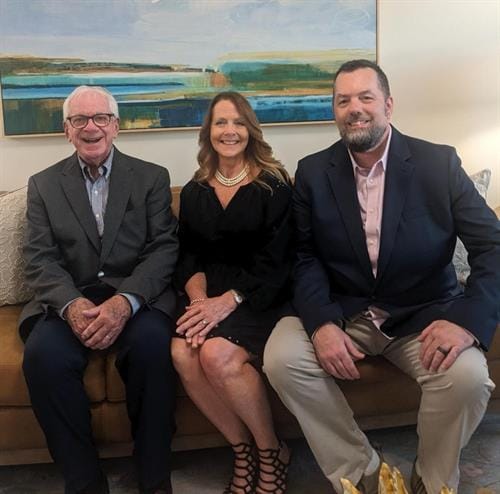
Mark Daley & Ken And Laura O’Dea
Serving Metro Charlotte, Pineville, Matthews, Mecklenburg and Union County
As the population ages, the need for specialized care for individuals with memory-related conditions continues to grow. In Monroe, North Carolina, memory care communities are designed to provide a safe and nurturing environment for those affected by Alzheimer’s disease, dementia, and other cognitive impairments. These communities not only offer essential medical support but also focus on enhancing the quality of life for residents through various engaging activities and personalized care plans.
Understanding Memory Care
Memory care is a specialized form of long-term care that caters to individuals with memory loss. Unlike traditional assisted living facilities, memory care communities are equipped to handle the unique challenges faced by residents with cognitive impairments. This includes providing a structured environment, trained staff, and tailored programs that promote mental stimulation and emotional well-being.
Key Features of Memory Care Communities
Memory care communities in Monroe NC offer several key features that set them apart from other types of senior living facilities. These features are essential for ensuring the safety and comfort of residents.
- Secure Environment: Many memory care facilities are designed with secure entrances and exits to prevent wandering, which is a common concern for individuals with dementia.
- Trained Staff: Staff members are specially trained to understand the needs of residents with memory loss, providing compassionate care and support.
- Personalized Care Plans: Each resident receives a tailored care plan that addresses their specific needs, preferences, and interests.
Benefits of Memory Care
Choosing a memory care community can provide numerous benefits for both residents and their families. These benefits extend beyond basic medical care, focusing on holistic well-being.
- Enhanced Safety: With 24/7 supervision and secure facilities, residents can feel safe and protected, allowing families to have peace of mind.
- Social Engagement: Memory care communities often host various activities that encourage social interaction, helping to combat feelings of isolation and loneliness.
- Emotional Support: Staff members are trained to provide emotional support, helping residents cope with the challenges of memory loss.
In addition to these benefits, memory care communities often incorporate therapeutic activities specifically designed to stimulate cognitive function. These activities may include art therapy, music therapy, and reminiscence therapy, which can evoke positive memories and emotions. Engaging in such activities not only aids in memory retention but also enhances the overall quality of life for residents, allowing them to express themselves creatively and socially.
Furthermore, many memory care facilities prioritize family involvement, recognizing the importance of maintaining connections with loved ones. Regular family meetings and open communication channels ensure that families are informed about their loved one’s progress and can participate actively in their care. This collaboration fosters a supportive environment where families can share experiences, resources, and coping strategies, ultimately enhancing the care provided to residents.
Life in a Memory Care Community
Life in a memory care community in Monroe, NC is designed to promote independence while ensuring safety and support. Activities are tailored to engage residents and stimulate their cognitive functions, making daily life both enjoyable and fulfilling. The environment is often warm and inviting, with staff trained to understand the unique needs of individuals experiencing memory loss. This specialized care allows residents to thrive in a setting that feels like home, where they can maintain their dignity and sense of self.
Daily Activities and Programs
Memory care communities offer a variety of activities aimed at enhancing cognitive function and providing social interaction. These activities may include:
- Art and Music Therapy: Creative programs that encourage self-expression and can evoke positive memories. Residents often find joy in painting, crafting, or participating in sing-alongs, which can spark nostalgia and foster emotional connections.
- Physical Activities: Gentle exercises and movement classes designed to promote physical health and mobility. These may include chair yoga, walking clubs, or dance sessions, all tailored to accommodate varying levels of ability and mobility.
- Reminiscence Therapy: Activities that encourage residents to share their life stories and memories, fostering connections with others. This can involve the use of memory boxes filled with personal items or photographs that prompt discussions and storytelling.
Engagement in these activities not only helps maintain cognitive function but also promotes a sense of belonging and community among residents. Additionally, themed events such as holiday celebrations or cultural days provide opportunities for residents to engage with one another and celebrate their shared experiences, creating lasting bonds and cherished memories.
Family Involvement
Family involvement is crucial in memory care settings. Many communities encourage family members to participate in activities and events, fostering a supportive network for residents. Regular family meetings and updates on residents’ progress help keep loved ones informed and engaged in their care. These meetings often serve as a platform for families to share their experiences, discuss challenges, and celebrate successes, reinforcing the importance of a collaborative approach to care.
Moreover, some communities offer educational workshops for families, focusing on understanding dementia and effective communication strategies. These resources empower family members to better support their loved ones and navigate the complexities of memory loss. By fostering an inclusive environment where families feel valued and informed, memory care communities strengthen the overall well-being of residents and enhance the quality of life for everyone involved.
Choosing the Right Memory Care Community
Selecting the right memory care community for a loved one can be a daunting task. It is essential to consider several factors to ensure that the chosen facility meets the specific needs of the resident.
Assessing Needs and Preferences
Before making a decision, it is important to assess the individual needs and preferences of the person requiring care. This includes evaluating their level of cognitive impairment, physical health, and personal interests. Understanding these factors can help narrow down the options and find a community that aligns with their needs.
Visiting Potential Communities
Visiting potential memory care communities is a crucial step in the selection process. During visits, families should observe the environment, staff interactions, and the overall atmosphere of the community. Questions to consider include:
- What is the staff-to-resident ratio?
- What types of activities are offered?
- How does the community handle emergencies or medical needs?
These observations and inquiries can provide valuable insights into the quality of care and the overall environment of the community.
Costs and Financial Considerations
Understanding the costs associated with memory care is essential for families. The expenses can vary significantly based on location, services provided, and the level of care required. In Monroe NC, families should be prepared for a range of costs and explore various financial options.
Understanding Pricing Structures
Memory care communities typically use different pricing structures, such as all-inclusive rates or a la carte pricing for specific services. It is important for families to understand what is included in the monthly fee and any additional costs that may arise.
Financial Assistance Options
Several financial assistance options may be available for families seeking memory care for their loved ones. These options can include:
- Long-Term Care Insurance: Policies may cover some or all of the costs associated with memory care.
- Medicaid: In some cases, Medicaid can provide financial assistance for eligible individuals.
- Veterans Benefits: Veterans and their spouses may qualify for benefits that help cover memory care costs.
Exploring these options can help alleviate some of the financial burdens associated with memory care.
Conclusion
Memory care communities in Monroe NC play a vital role in supporting individuals with cognitive impairments and their families. By providing a safe, engaging, and nurturing environment, these communities help enhance the quality of life for residents while offering peace of mind to their loved ones. As the need for memory care continues to rise, understanding the features, benefits, and considerations involved in choosing a community will empower families to make informed decisions for their loved ones.
Ultimately, the right memory care community can make a significant difference in the lives of those affected by memory loss, fostering dignity, respect, and a sense of belonging.
If you’re seeking a memory care community in Monroe NC or the broader Metro Charlotte area, Assisted Living Locators is here to guide you through the process. With the average cost of assisted living in the Charlotte area at $4,400 per month, we understand the importance of finding a solution that fits your budget. Whether you’re considering options from $2,500 to $20,000 per month, we are committed to locating the perfect senior living care that meets your loved one’s needs and ensures their comfort and care. Charlotte’s favorable climate, cultural attractions, and comprehensive healthcare services make it an ideal location for a fulfilling senior lifestyle. Let us help you navigate the wealth of options available. For personalized assistance and expert advice, Get Local Help from Assisted Living Locators today.









